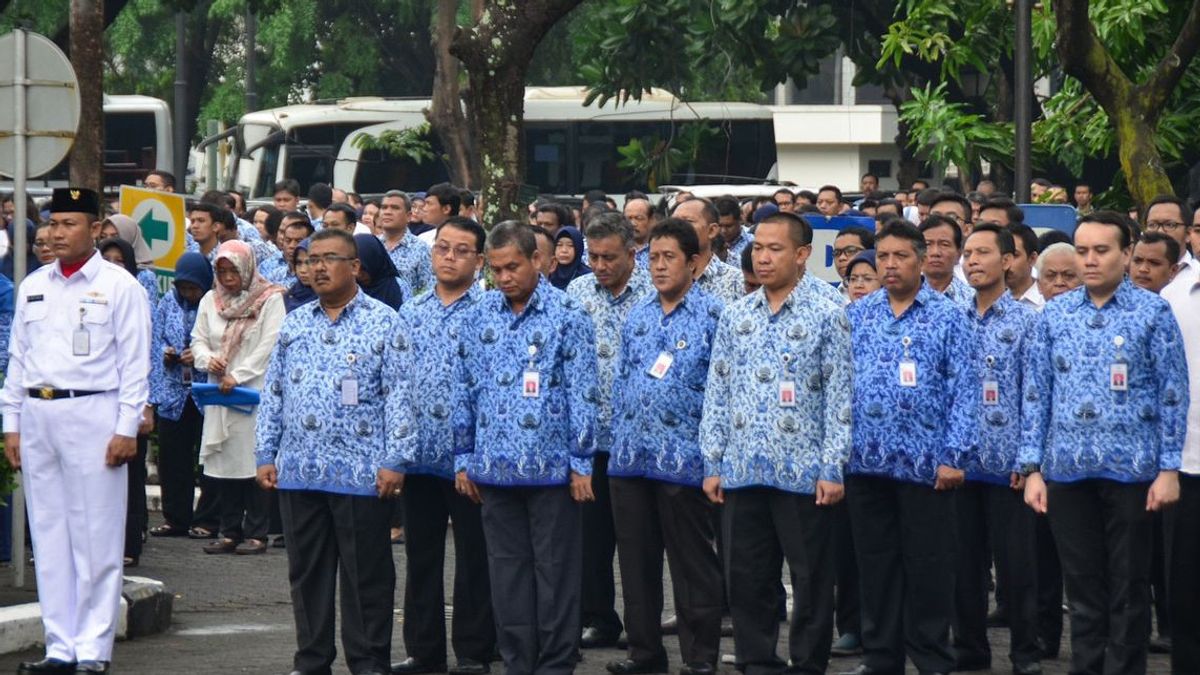JAKARTA - Civil Servants (PNS) is a job that is still the dream of most undergraduate graduates. Safe from termination of employment as long as there is no action. Also, the income of civil servants is considered quite good, at least until this year. How much is the salary for civil servants?
Before starting to calculate civil servant salaries, let's first find out the reasons many people desire to become state servants. Of course, there is a reason why a civil servant's salary is ideal.
Ideal profession civil servant
1. Clear civil servant salaries
Being a PNS or State Civil Apparatus (ASN), apart from its own prestige, also gets many facilities and benefits provided by the state for free. The salary for civil servants is currently considered sufficient to meet all the necessities of life.
Through the official website of the State Civil Service Agency (BKN), the salaries of civil servants are disclosed. In general, the salaries for category I civil servants range from IDR 1.56 million to IDR 2.68 million. Certainly higher than the average minimum wage, especially Yogyakarta, right?
BKN also released the salary levels for other civil servants, such as class II, which have a salary range of between IDR 2 million and IDR 3.80 million. Meanwhile, for class III it ranges from IDR 2.57 million to IDR 4.79 million.
Finally, group IV has a salary ranging from IDR 3 million to IDR 5.9 million. Interestingly, the amount of the salary is the basic salary, not including various other benefits.
2. Pension funds
Apart from high salaries, the pension fund guarantee is an attraction for anyone to become civil servants. Who does not want to live in security until no longer working or retired? Everyone seems to want it.
The interesting thing is that now the pension funds that are obtained every month become fully funded from the basic salary. From previously only 75 percent of the basic salary, it is now increasing thanks to a new scheme established by the government, in which the accumulated figure is 75 percent of joint employees and 15 percent of the state.
The amount listed is not only calculated from the basic salary. But it also includes wife's allowance, child allowance, job allowance, and work power allowance. This policy will be realized in 2020 for new ASN employees who register in the same year, even though the old ASN employees consistently apply the old policy.
3. Anti layoffs
Layoffs are a scourge for employees and workers everywhere. But for you a civil servant, this does not appear to be a problem. One of the benefits of civil servants is that they never get layoffs. Why does it happen?
The civil servant legislation itself does not include regulations regarding layoffs. So there is no reason for the state to fire its workers. However, civil servants can still be dismissed if they are caught in major cases, such as criminal acts and acts that violate state law.
4. Light workload
Work casually but get a large salary and benefits, who doesn't want to? Interestingly, until now, civil servants are considered to have relatively easy and light pressure and workloads. This makes the elderly always want their children to become civil servants.
The assumption of a "comfort zone" was still thick in Indonesian society when he became a civil servant. However, in the present time, the work of civil servants is not very light. There are many new demands and regulations that civil servants must obey.
5. Prestige
Being a civil servant, apart from getting a high salary and benefits, also becomes a prestige or pride. How come. To become a civil servant, candidates must pass various tests, in a big and fierce competition.
6. Clear career path
In addition to the competitive civil servant entrance test, being a civil servant is also considered by the community as an established job because it is financially guaranteed. Apart from that, the career path for civil servants is also quite clear.

Knowing the level of civil servants
After knowing some of the reasons why civil servant jobs are coveted, let's study the calculation of civil servant salaries based on their levels or categories.
As mentioned in the discussion above, civil servants have a clear career path. This provides an opportunity for each employee to work optimally in order to get a promotion.
The higher a position, the greater the salary and benefits you get. So what are the groups in the civil servant structure, here is an overview?
1. PNS Category I
The rank of the PNS I class is the earliest group which is further divided into Group I A (Juru Muda), I B (Juru Muda Level 1), I C (Juru), I D (Juru Level 1).
The I A PNS group can hold several positions in central agency positions including Secretary-General, Main Secretary, Head of Agency, Deputy, Junior Attorney General, to Main Inspector.
Then PNS group I B can serve as expert staff at the central level, and Regional Secretary at the provincial level.
2. Civil servants Category II
The rank of PNS II or Regulators is divided into II-A (Youth Regulators), II (Youth Regulators Level 1), II C (Regulators), and II D (Level 1 Administrators).
Rank II A civil servants in central agencies can serve as Director, Head of Bureau, Head of Center, Assistant Deputy. Then in the province of this group can serve as Governor Expert Staff, DPRD Secretary, Head of Service, Head of Agency. Then at the regional level can serve as Regional Secretary.
Then Group II B Civil Servants in the central agency can serve as Head of Balai Besar, and in the province can serve as Head of Bureau, Director of Class B Public Hospital, Deputy Director of Class A General Hospital, and Director of Class A Special Hospital.
3. Civil servants Category III
The rank of Civil Servant III or Administrators is divided into III A (Young Administrators), III B (Young Administrators Level 1), III C (Administrators), and III D (Level 1 Administrators).
Civil servants rank III A can hold positions in central agencies as Head of Divisions, Head of Fields, and Head of Subdirectories. Then at the provincial level can serve as Head of Office, Head of Section, Head of Field, to Coconut UPT Dinas.
Then the Civil Servant III B Group in the central agency can serve as the Head of the Regional Office. Then at the provincial level, can serve as Head of Section at Regional Hospitals and Head of Fields at Regional Hospitals.
At the regional (district) level, Civil Servant III B can serve as Head of Fields at Services and Agencies, Head of Divisions and Heads of Fields at Regional General Hospitals, Director of Class D Regional General Hospitals, and Secretary of the District Head.
4. Civil servants Category IV
The rank of PNS IV or coach is divided into IV A (coach), IV B (coach level 1), IV C (young coaches), IV D (middle coaches), and IV E (main coaches).
The rank of PNS IV A at the central level can serve as Head of Subdivision, Head of Subdivision, and Head of Section. Then in a category IV province can serve as Head of Subdivision, Head of Subdivision, and Head of Section.
Then Group IV A at the regional level (regency or city) can serve as Head of Subdivision, Head of Subdivision, Head of Subdivision, Head of Section, Head of UPT Services and Agencies.
Group IV B at the regional level can then serve as the Secretary of the Sub-district, Head of Section in the Sub-district, Head of Subdivision in the UPT, Head of Sub-Section Secretary of the District, and Head of Administration for Middle or Vocational Schools.
5. Civil servants Category V
Finally, the V-A class civil servants who at the central agency can serve as Head of Affairs, and at the regional level can serve as Head of Administration for Middle Schools, and Head of Administration for Middle Schools.
How Much is the 2020 Civil Servant Salary?
For more than 40 years, regulations regarding the amount of salary for civil servants have referred to PP number 7 of 1977 concerning civil servant salary regulations. However, in 2019 there have been changes. This change is not the first time because it has changed 18 times.
The amount of the latest civil servant salary is regulated in Government Regulation or PP number 15 of 2019. Some of the civil servant salaries below are calculated based on their level or class, so the higher the group, the more salary they will get.

1. Salary for Class I Civil Servants
- Salaries for Golonga 1A civil servants for 0 years of service are IDR 1,560,800 and IDR 2,335,800 for 26 years of service.
- Salary for Class 1B civil servants for a 3-year service period is IDR 1,704,500 and IDR 2,474,900 for a 27-year service period.
- Salaries for Class 1C civil servants for the 3-year work period are IDR 1,776,600 and IDR 2,557,500 for the 27-year class.
- Salaries for Class 1D civil servants for 3 years of service are Rp1,851,800 and Rp2,686,500 for 27 years.
2. Salary for Class II Civil Servants
- Salaries for Class 2A civil servants with 0 years of service are IDR 2,022,200 and IDR 3,373,600 for 33 years of service.
- The salary for Class 2B civil servants for a 3-year service period is IDR 2,208,400 and IDR 3,516,300 is 33 years.
- Salary for civil servants Category 2C for 3 years is IDR 2,301,800 and IDR 3,665,000 for 33 years of service.
- Salaries for 2D civil servants for 3 years of service are IDR 2,399,200 and IDR 3,820,000 for 33 years of service.
3. Salary for Class IIIA PNS 2020
- Salary for Class 3A civil servants for a 0-year service period is IDR 2,579,400 and IDR 4,236,400 for a 32-year service period.
- Salary for Class 3B civil servants for a 0-year service period is IDR 2,688,500 and IDR 4,415,600 for a 32-year service period.
- Salary for civil servants in Category 3C for a 0-year service period is Rp2,802,300, and for a 32-year service, the period is IDR 4,602,400.
- The salary for civil servants in the 3D category for a 0-year work period is IDR 2,920,800, and for a 32-year work period, it is IDR 4,797,000.
4. Salary for Class IV Civil Servants
- Salary for Class 4A civil servants for a 0-year service period is IDR 3,044,300 and IDR 5,000,000 for a 32-year service period.
- Salary for Class 4B civil servants for a 0-year service period is IDR 3,173,100 and IDR 5,211,500 for a 32-year service period.
- Salaries for class 4C civil servants for 0 years of service are IDR 3,307,300 and IDR 5,431,900 for 32 years of service.
- Salary for 4D civil servants for a 0-year service period is IDR 3,447,200 and IDR 5,661,700 for a 32-year service period.
- Salary for Class 4E civil servants for a 0-year service period is IDR 3,593,100, and IDR 5,901,200 for a 32-year service period.
So, how much is the PNS allowance?
The above description of civil servant salaries does not include various allowances. So what are the benefits? There are several benefits including performance allowance, meal allowance, husband or wife allowance, child allowance, and official travel allowance.
1. Performance allowances for civil servants
Not only basic salary, but civil servants also receive various benefits, one of which is performance or performance allowances. The civil servant performance allowance actually already has an exact figure calculation, according to each agency as well.
The size of the performance allowance is based on three elements, the first is attendance, performance achievements, and also employee discipline. If any of these elements is reduced, the amount of the performance allowance will also decrease. Thus, the performance allowance is volatile.
Currently, the highest performance allowance is employees at the Ministry of Finance, employees with a service period of 27 years can get an allowance of IDR 46.95 million. This is as regulated by Presidential Decree 156/2014.
Then in other ministries, such as the Ministry of Transportation, Industry, Agriculture, and Agriculture, the highest position can receive an allowance of up to IDR 33.2 million, and the lowest position receives IDR 2.53 million.
2. Food allowance for civil servants
Food allowance for civil servants as regulated in the Law of the Minister of Finance of the Republic of Indonesia Number 72/PMK.05/2016 concerning Meal Allowance for State Civil Service Employees.
In this regulation, there is a description of the food allowance given according to employee attendance for one month. Meal allowances are not given to employees who are absent from work, go out of town, leave, study assignments, and are seconded to agencies outside the government.
Regarding the amount of food allowance, everything has been regulated in the Law of the Minister of Finance of the Republic of Indonesia Number 32/PMK.02/2018 concerning the Proposed Standard Tariff for the Fiscal Year 2019 which was issued by the Minister of Finance on March 29, 2018.
The amount of the food allowance is differentiated by class, including Category, Group I IDR 35,000, Group II IDR 35,000, Group III IDR 37,000, Group IV IDR 41,000.
3. Structural civil servant position allowance
The civil servant office allowance is a relatively large addition. Even though the rules regarding the size of the position allowance are regulated in the law, the President has the authority to consider them.
The civil servant office allowance itself only applies to employees who have been appointed and assigned to structural positions. So those civil servants who are entitled to the position allowance are those who belong to the V–I Echelon group. What is the amount?
The amount of allowances for Echelon I to II officials is as follows. Echelon IA gets IDR 5,500,000, and Echelon IB gets IDR 4,375,000. Then for Echelon IIA gets IDR 3,250,000, and Echelon IIB gets IDR 2,025,000.
How much is the Group 3A to 5A (Echelon) civil servant allowance?
Furthermore, the amount of the position allowance for the Echelon IIIA class is IDR 1,260,000, then for the Echelon IIIB class is IDR 980,000.
Furthermore, civil servants in Echelon IVA positions are entitled to a position allowance of Rp. 540,000, and Echelon IVB is IDR 490,000. lastly, a VA Echelon class official is entitled to IDR 360,000.
4. Husband and wife allowances
Even though the civil servant profession is required to exert all power and thought in the interests of the state, this does not mean that the state will allow its servants to live difficult lives and sacrifice their personal lives.
Civil servants will be guaranteed the welfare of their families as regulated in article 7 of Law Number 8 the Year 1974. This article regulates the salary according to their profession and responsibilities.
One of these articles also regulates family allowances for husbands or wives as well as child support. The amount of husband or wife allowance is regulated in Article 16 Government Regulation Number 7 the Year 1977. The amount of allowance for the wife or husband alone has a value of 5 percent of the civil servant's basic salary. If the husband or wife both work as civil servants, the allowance will be given to the one with the highest basic salary.
5. Child support
Similar to wife or husband allowances, child allowances are also listed in Article 16 Government Regulation Number 7 of 1977. Civil servants have the right to receive allowances for biological or adopted children.
The amount of child support provided is 2 percent of the basic salary. However, there is a limit to the amount of the allowance, which applies to three children. Also, there are other criteria, namely the age of the child is less than 18 years old and has never been married. Children who are entitled to support also do not have their own income.
6. Official allowance
Civil servants who travel out of town or abroad will receive an official travel order (SPPD) and receive additional money. This is stated in the regulation of the Minister of Finance Number 07/ PMK.05/2008.
Civil servants' official travel consists of a daily allowance which includes food, pocket money, and local transportation fees. Also, civil servants are entitled to employee transportation, lodging, representative fees, and vehicle rental rates in the city.
Not surprisingly, from some discussion of PNS salaries and some of the benefits above, many millennials become obsessed with becoming civil servants. Are you one of them?
BERNAS Others
The English, Chinese, Japanese, Arabic, and French versions are automatically generated by the AI. So there may still be inaccuracies in translating, please always see Indonesian as our main language. (system supported by DigitalSiber.id)












